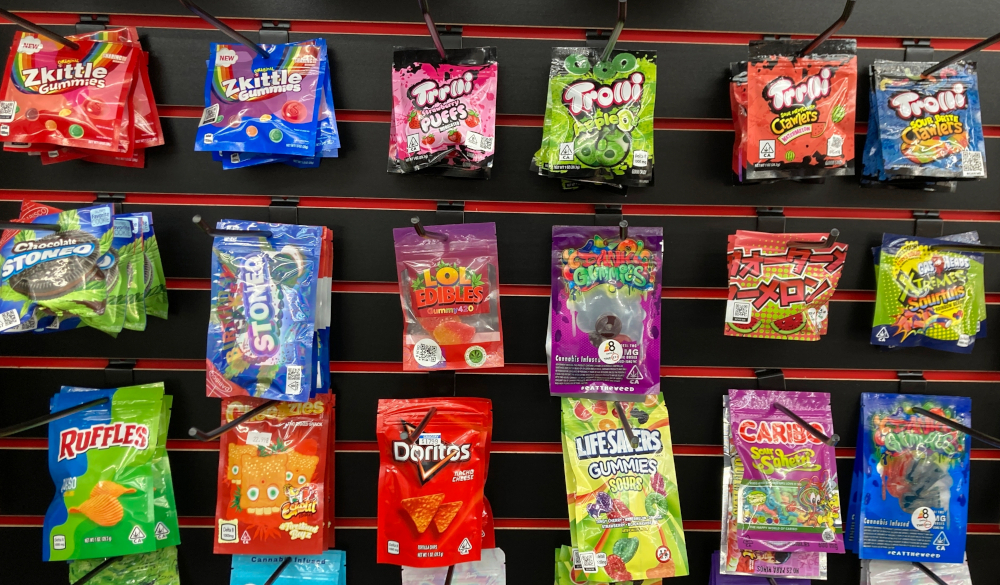Shady producers of delta-8 THC, the popular synthetic form of marijuana made from hemp-derived CBD, are crying the blues as states ramp up their attempts to protect children from the psychoactive products.
The proliferation of CBD itself was not accounted for when hemp was legalized as a result of the 2018 Farm Bill, which failed to anticipate the development of a thriving extract market by producers who took advantage of the loophole.

As the CBD market boomed and then crashed quickly in the wake of the Farm Bill’s passage, producers still surviving in the lingering downturn found a market among makers of delta-8 THC, which is concocted by putting CBD through a process in the lab. It’s a kind of hemp product that the Farm Bill never intended, widely available at common retail outlets in packaging that mimics leading brands of candy and other treats.
Guidance desperately needed
In the absence of federal rules from the U.S. Food & Drug Administration (FDA), individual states have been dealing with CBD and delta-8 THC. But the states need federal guidance. That’s why state cannabis regulators recently sent a letter to Congress suggesting a national framework be established for all hemp-based cannabinoids – including CBD and any downstream products made from CBD as well as other minor cannabinoids present in industrial hemp. The letter, from the Cannabis Regulators Association (CANNRA), was in response to a request for input on CBD regulations from key Congressional committees in July.
“A comprehensive regulatory approach that accounts for all cannabinoid hemp products is urgently needed,” the regulators wrote in the 40-page letter. “A focus on CBD alone is insufficient, in part because many CBD products contain other cannabinoids which also need to be regulated for consumer safety and public health.
‘Public health at risk’
“Consumer safety and public health are at risk if a federal regulatory agency is not named, funded, and given the authority to regulate cannabinoid hemp products. FDA is the primary federal agency with experience regulating finished products for consumer safety and public health,” the CANNRA letter observes.
“That said, FDA needs specific authorities and defined, short timelines under which to issue regulations. Those regulations should include clear boundaries and definitions for products that will be regulated as ‘cannabinoid hemp,’ minimum requirements for safety, and an education and enforcement framework,” the letter further concludes.
State actions
Officials in many states continue to grapple with CBD and delta-8 products in the absence of a federal framework.
In Florida, agriculture officials recently launched “Operation Kandy Krush,” which comes after a new state law added age requirements for the purchase of hemp products intended for human consumption, and prohibits marketing that targets children. The state said it will strongly enforce the law. State officials say they have uncovered almost 70,000 illegal products under packaging that mimics such popular kid brands as Nerds, Sour Patch Kids, Skittles and Jolly Ranchers from 500 hemp stores.
In Arkansas, a ban that took effect Aug. 1 covers synthetically produced delta-8 and delta-10 forms of THC, and hemp-derived delta-9 THC (the most common form of THC found in greater amounts in marijuana plants). All of those hemp-derived compounds are now included on the state’s controlled substances list, which is where they should be. The law also requires retailers of such products to be licensed by Arkansas Tobacco Control. Hemp stakeholders have challenged the ban in a case currently before a federal court in Little Rock.
Kentucky earlier this month issued emergency delta-8 regulations, which the state says is the starting point for regulating delta-8 products “and any other hemp-derived substances.” The regulations prohibit the sale of intoxicating hemp products to anyone under 21 years of age, and set lab testing requirements and labeling rules.
Producers whine
In all cases, CBD and delta-8 producers have whined about overreach as they face the threats to their dubious products.
Unregulated and sometimes dangerous CBD products have been on the market since even before the 2018 Farm Bill was passed. Such products spawned a wild and woolly gray market in the absence of FDA regulations. Reports have consistently shown that CBD products are substandard, often adulterated with heavy metals and other contaminants, contain less CBD than advertised, and are promoted through wildly inflated health claims. CBD-based delta-8 THC started appearing a few years later, opening the window of danger even further.
Restrict delta-8 to pot shops
FDA’s slow reaction to CBD leaves consumers continually at risk. The agency late last year called on Congress to set a general framework for the products through a new law on which it can base specific safety rules – resulting in a “new path” for the category.
Delta-8 products, one step removed, present even greater safety threats because the products produce a “high.” When properly formulated under safe processes, there’s nothing inherently wrong with delta-8 THC. But delta-8 products should go under rules for marijuana and be strictly limited to licensed marijuana dispensaries, with proper labels and warnings in place. Children should not have access to delta-8 products at their local convenience store or bodega – as they now do.
Make CBD a drug
FDA and many independent researchers have said the full effects of CBD are still not known, and have expressed concerns over the compound’s potentially harmful effects on pregnant women and fetuses, young children, the elderly, and the liver and male reproductive system.
Only long-term research can determine how safe CBD actually is. Until that research is in, FDA would serve its true mission by simply formalizing CBD’s current classification as a medicine-only, a designation for which it is already approved. That can be changed later depending on what the research shows.
Consumers have been at the mercy of dodgy CBD and delta-8 THC producers for years. Operators in these subsectors of the broader hemp industry have done serious damage to hemp’s reputation overall, causing fiber and food markets to also hit the skids.
By failing to get any kind of framework in place immediately, FDA is leaving too much power in the hands of unscrupulous companies who’ve shown time and time again that they don’t care about consumer safety in their chase for profits (and survival).

